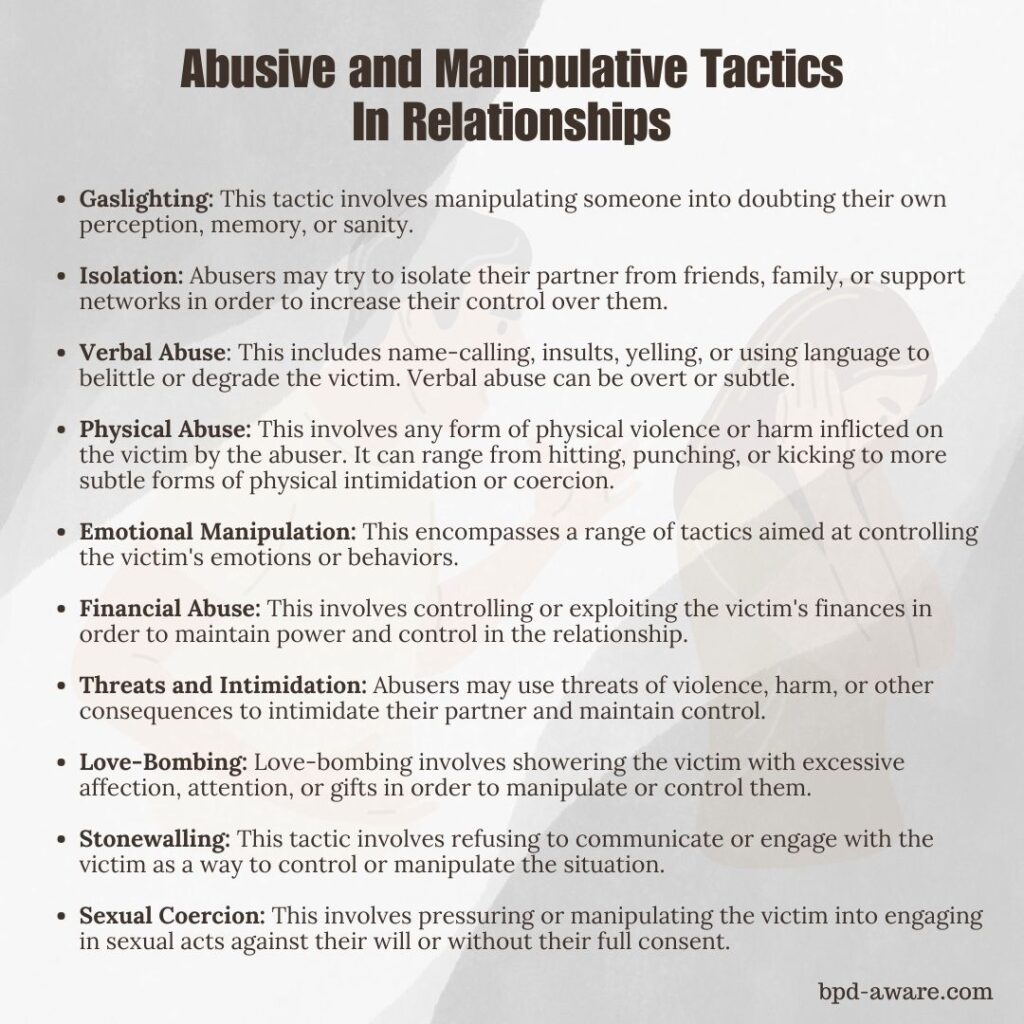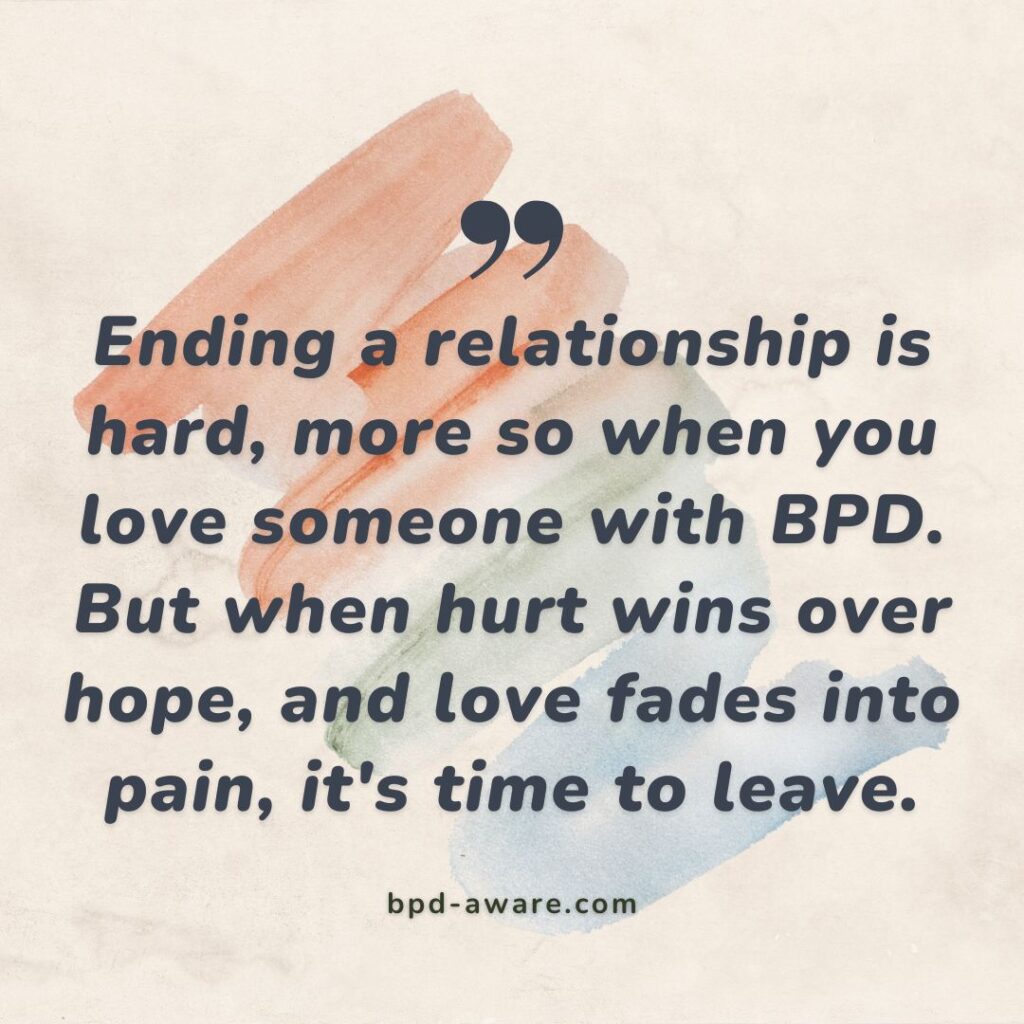Borderline Personality Disorder (BPD) is incredibly difficult to live with. The constant emotional instability, the fear of abandonment, the splitting, and all the other symptoms can make life feel like hell. It can be tough living with someone who has BPD too. The symptoms of BPD don’t just affect the sufferer, but everyone around them.
When you have a partner who has BPD, you do your best to love and support them. When things go well, this love and support, along with therapy and other life changes, can help them make a recovery from their maladjusted thoughts and behavior. This, however, isn’t always the case. Sometimes you come to a point where you realize the relationship is in real trouble due to your partner’s behavior.
Even if you care for them and want to help them get better, there are clear signs when it’s time to leave someone with BPD.
Conflicts Within the Relationship Are Escalating
Escalating conflicts in a relationship with someone who has BPD can be a big warning sign that it might be time to end things. If you regularly find yourself in massive arguments that blow up fast, facing sudden bursts of anger or rage that don’t match what’s happening, or dealing with words or actions that hurt you on purpose, it’s a bad sign. These kinds of fights can harm not just how you feel inside, but also your physical safety if things turn into actual fights. Living in a constant state of stress, fear, and shake-ups can make finding calm or fixing problems really hard for both people.
When trying to calm things down doesn’t work time and again, and if being safe and okay is always at risk, it might be best to walk away from someone with BPD to look after your own safety and mental health.
Chronic Patterns of Manipulation and/or Abuse
Some people with BPD often use manipulative or abusive tactics to get what they want, like making others feel guilty, twisting their words, or being cold but hostile to control how others feel or act. They might shout insults, hit, throw things, use gaslighting, hoovering, or try to take over and cut off their partner from others.
Using these tricks can break trust in the relationship, making the other person doubt themselves. It also makes the relationship shaky, filled with worry, and mixed feelings. At its worst, it can be outright dangerous.
Being treated this way can cause a lot of stress, sadness, fear, and even PTSD, along with short or long-term health issues from stress.
It’s important to set clear limits to protect oneself from being treated badly. It helps to know when someone is using manipulation tactics or being abusive. Being around this too much can make someone stuck in a bad cycle and hurt more over time. If trying to fix things doesn’t work, it’s often safest to leave the relationship to find a healthier, safer place.

They Consistently Violate Boundaries
Consistent violation of agreed-upon boundaries by a partner with BPD can inflict significant strain on the relationship. Examples of violated boundaries may include disregarding privacy by reading personal messages or emails without permission, repeatedly crossing physical boundaries such as invading personal space, engaging in physical aggression, or ignoring established limits regarding communication or time spent together. These breaches not only undermine trust but also demonstrate a lack of respect for the autonomy and well-being of the other partner. The strain caused by persistent boundary violations can erode the foundation of the relationship, fostering feelings of resentment, frustration, and emotional exhaustion.
When attempts to address these breaches are met with indifference or repeated transgressions, it may signify a fundamental lack of compatibility or respect within the relationship, serving as a valid reason to consider ending it to protect one’s emotional and psychological boundaries.
Not Seeking Treatment Or Not Taking Treatment Seriously
Not being willing to get help or not taking treatment seriously can really push a relationship to its limit, leading to feelings of being stuck, lost, and bitter.
Signs of not moving forward in getting better include not wanting to go to therapy, not taking medicine as told, or keeping up with actions that hurt without trying to change. Also, not wanting to look inward or saying it’s not their fault can make things worse.
When a partner with BPD doesn’t want to get help or take getting better seriously, it keeps the cycle of ups and downs and fights going, and it stops a healthy, happy relationship from being possible. In these cases, knowing you need to look out for yourself and seeing that your needs are not being met might mean you have to leave, especially if your attempts to help them get help are ignored or turned away.
Your Own Mental Health Is Beginning To Suffer
Having a partner with Borderline Personality Disorder can really test your mental health, leading to lots of stress and mentally tough times. Always dealing with their sudden mood changes, facing big fights, and trying to handle how unpredictable they act can be unbelievably hard. The ongoing stress of feeling like it’s your job to keep them okay, while also dealing with how their mood swings affect you, can make you feel anxious, sad, and worn out. Also, always having to watch how you react to keep from making their symptoms worse can leave you feeling tired inside.
It’s very important to remember that looking after your own mental health is key to staying strong and able to cope with these challenges. Getting support from friends or mental health experts, making clear limits, and taking time for self-care are critical steps to keeping your mind healthy while dealing with a partner with BPD.
You’ve Fallen Out of Love With Your Partner
Sometimes we may stop loving our partners, no matter how they act. This can be for many reasons, like growing as a person, changes in how well we get along, or how we feel about each other. It’s important to know that falling out of love isn’t always because of something “wrong” with the person with BPD or anything outside of that. Sometimes people just grow apart. Relationships change over time, and feelings can shift as we change too. But, staying in a loveless relationship isn’t good for both people.
Going on without true love can make both people feel bitter, unhappy, and disconnected. In such cases, breaking up is often the best and kindest choice for both parties, letting each person find joy and love somewhere else.
If you are considering breaking up or ending contact with someone who has BPD, we have a guide on how best to do so. -> How to Break Up With Someone Who Has Borderline Personality Disorder

Final Thoughts
In the end, knowing when it’s time to leave someone with BPD is hard but can be necessary for your own good. From ongoing manipulation to more fights, not respecting personal space, and even mean behavior, the impact on your mental and physical health can’t be ignored. Leaving a relationship with a partner with BPD isn’t easy, but it’s a brave step towards taking care of yourself.
Every relationship is different, and people with BPD can get help and improve, but it’s important to see when staying puts your safety, happiness, and life quality at risk. By making clear personal limits, looking for support, and choosing to leave when needed, you can start to heal, grow, and open up to the chance of better relationships in the future.
Sources, Resources, and Further Reading
- When (and How) to Break Up with Someone You Love: https://www.healthline.com/health/when-to-break-up-with-someone-you-love
- When to Break Up With Someone and When to Stick It Out: https://markmanson.net/when-to-break-up-with-someone
- Mental Illness in a Relationship: When Leaving May Be Necessary: https://restore-mentalhealth.com/leaving-mental-illness-in-relationship/
















